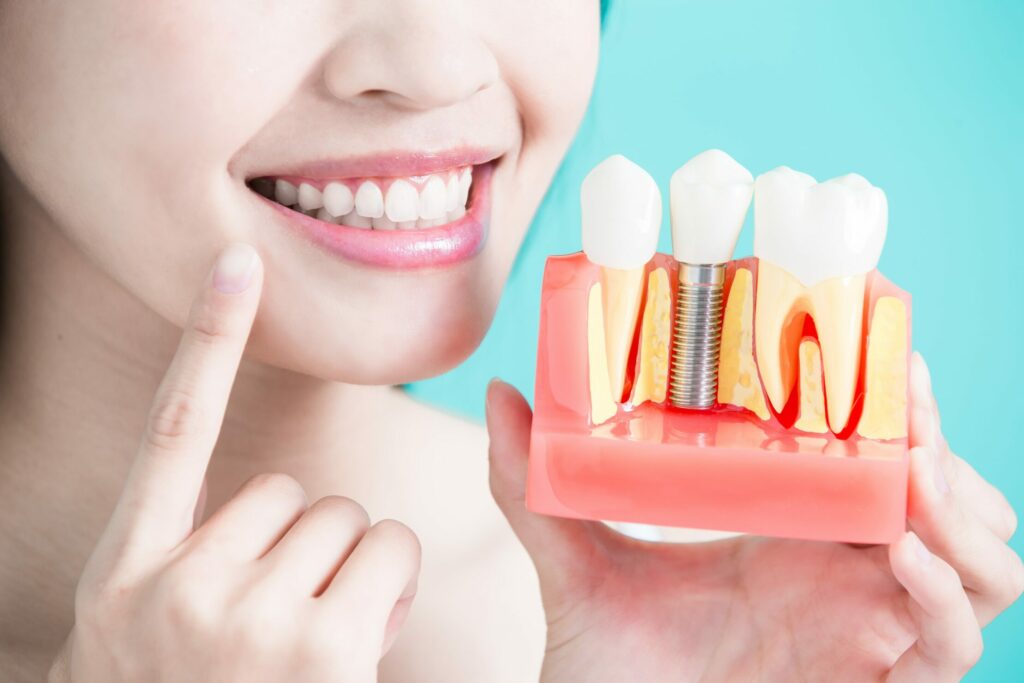Dental implants are by far the most popular option for replacing individual missing teeth in addition to supporting implant-supported dental bridges and implant-supported dentures designed to replace several consecutive missing teeth.
Whether or not you need an initial bone grafting procedure before your new dental implant or implants could be placed, the process of getting a dental implant can be fairly lengthy, depending on how quickly your body heals and completes the osseointegration process between your jawbone and new dental implant. With so much time invested in your new dental implant, you’ll want to be sure you take good care of it to ensure both the implant and your permanent crown last as long as possible.
8 Tips to Care for Your Dental Implants
1. Follow Post-Operative Instructions Carefully
We provide patients with instructions to follow in the first 24 hours after receiving a dental implant. To ensure your healing and osseointegration process starts smoothly, it’s important to follow these instructions carefully. While they might vary slightly from patient to patient, aftercare instructions typically include the following points:
- Bite on the sponges placed in your mouth to help blood clots form and control bleeding.
- Only consume liquids and soft foods.
- Do not suck through a straw.
- Keep your head elevated.
- Don’t move around excessively or perform any strenuous activities.
- Apply a cold compress in 15-minute intervals to control swelling.
- Do not rinse your mouth.
- Use over-the-counter anti-inflammatories for any pain.
- Take any prescription medications exactly as prescribed.
2. Avoid Alcohol and Tobacco
In the days, weeks, or months following an implant placement procedure, it’s best to avoid tobacco and alcohol use altogether. Both of these habits can increase inflammation in your mouth and slow the healing process.
3. Practice Good Oral Hygiene
You should brush at least twice a day and floss at least once a day. Good oral hygiene habits are always important, but they’re especially essential when you have a dental implant.
Keeping the area around your implant free from plaque, food debris, and bacteria will help the area around your new implant heal properly. Once healed, continuing to maintain your oral hygiene will ensure your dental implant remains securely in place in your jawbone and that the tissues surrounding it stay healthy.
Neglecting your oral hygiene can lead to an influx of harmful bacteria along the gumline around your dental implant. Left unchecked, this can progress into a full-blown infection called periodontal disease which can actually lead to the deterioration of the jawbone. This could result in a dental implant becoming loosened and compromised.
4. Use the Right Dental Care Tools
When caring for a dental implant, be sure you’re using the right dental care tools. Always choose a toothbrush with soft, nylon bristles. We strongly encourage dental implant patients to invest in a high-quality electric toothbrush which ensures you use proper brushing technique and does a better job of gently removing plaque and other debris from the area around a dental implant.
You can also use a floss threader or soft interdental cleaning tool to floss around your dental implant. Another great option for flossing and thorough dental implant cleaning is a water flosser.
5. Don’t Chew on Hard Foods or Objects
Caramel, hard candy, bread with hard crusts, steak, apples, carrots – basically, any food that’s too hard or chewy can damage your dental implant. Additionally, you should never chew on ice, pen caps, or any other hard items.
6. Avoid Overly Abrasive Dental Care Products
Even if they’re approved by the American Dental Association, some oral care products (especially whitening toothpaste) are so abrasive they can damage the surface of the permanent crown that’s capping your dental implant and acting as your replacement tooth. To make sure your crown is safe and will last as long as it should, stick to dental care products that are formulated for sensitive teeth. These are less abrasive and won’t damage your dental crown.
7. Stay Hydrated
There are lots of health-related reasons to drink plenty of water and keep your body hydrated, and you can add “it’s good for your dental implant” to the list! Staying hydrated ensures that your saliva production remains active throughout the day, and saliva continuously works to wash harmful bacteria away from your teeth and gums, keeping them (and your new dental implant) in good shape.
8. Schedule Regular Dental Checkups and Cleanings
Once you have your new dental implant, you should continue to schedule bi-annual dental exams and professional teeth cleanings to maintain your oral health, prevent periodontal disease, and ensure your new dental implant is well cared for.
Comprehensive Dental Implant Care at Northern Colorado Implant and Prosthetic Dentistry
At Northern Colorado Implant and Prosthetic Dentistry, Dr. Andrew J. Bock is pleased to provide our patients with comprehensive dental implant care and prosthetic dentistry services. Whether you’re missing one or more teeth, we can talk with you about your permanent tooth replacement options using dental implants.
To learn more about dental implants, whether they’re the right treatment option for you, or to schedule a dental implant checkup or restoration appointment, we welcome you to contact our office today. We look forward to helping you restore your teeth to create a healthy and long-lasting smile!






